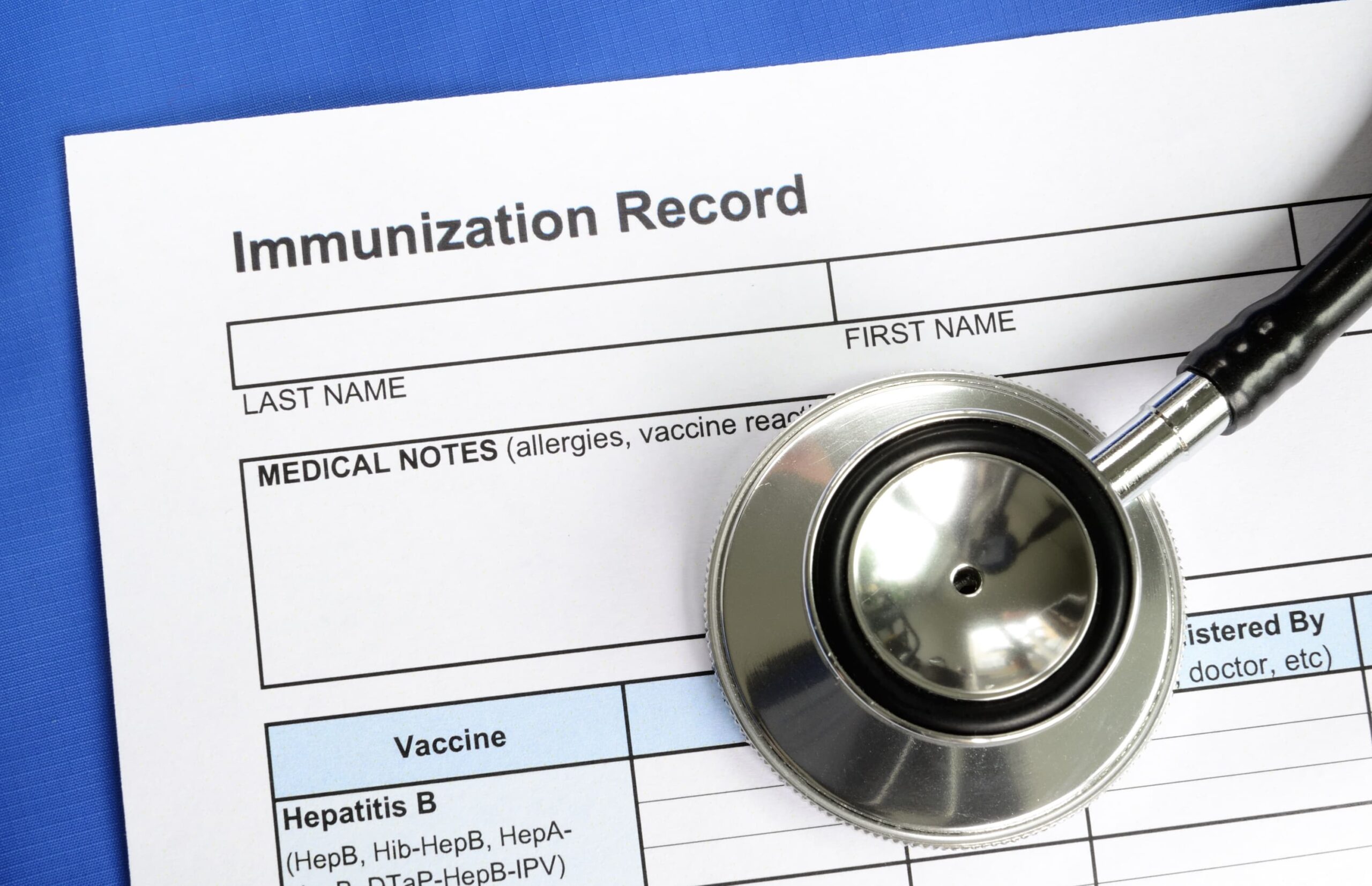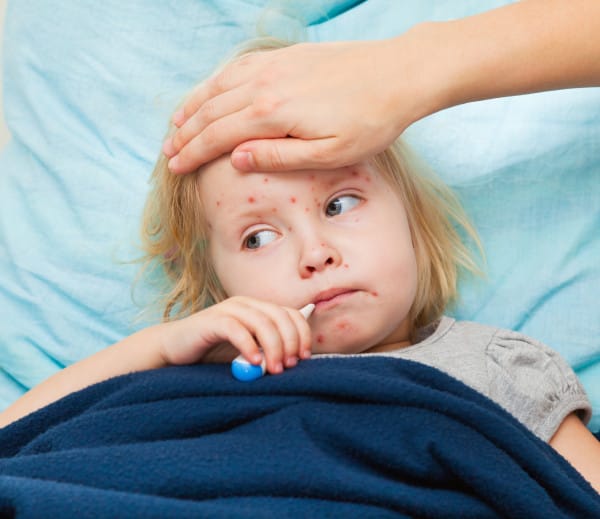Melatonin is a well known sleep supplement. You may be wondering: “Should I take melatonin?” This article outlines why I prescribe melatonin, including the benefits of melatonin, drugs that deplete melatonin, how to dose melatonin, side effects of melatonin, and some safety notes about melatonin in certain populations (autoimmune, pregnancy, breastfeeding, infants).
Even though melatonin is safe, it’s always a good idea to check with your physician before taking it or giving it to your child.
What is Melatonin?
Melatonin is an important hormone that not only regulates sleep but also regulates the gastrointestinal tract, inflammation, hormones, immune function, and more. In the body, it is created from serotonin, which in turn is created from 5-hydroxytryptophan (5-HTP). 5-HTP is a derivative of the amino acid tryptophan that is found in protein containing foods and supplements.
Top Reasons That I Prescribe Melatonin
Melatonin helps regulate the circadian clock, helps reduce inflammation, helps modulate the immune system, and is a potent antioxidant. The reasons why I prescribe melatonin are related to these functions, but melatonin does so many things in the body that we are still learning about!
1. Restore Sleep
Sleep is the most common reason why I prescribe melatonin. However, it isn’t useful in every insomnia case. I find it most helpful for restoring circadian rhythms (after travel or holidays), treating side effects of stimulant meds that keep kids awake, and insomnia after head injury as well as when lifestyle, medication, or aging have resulted in low melatonin levels that result in difficulty falling sleep.
2. Digestive Problems
There has been a lot of research done on the use of melatonin for digestive concerns. It is helpful in reducing the pain associated with IBS and improving sleep for those who have IBS. It can also be helpful as part of a treatment for reflux.
3. Neuroinflammation
Melatonin is a strong anti-inflammatory and antioxidant for the brain. It is helpful for recovery from concussion and post concussion syndrome. I sometimes encourage my patients who are at risk of head injury (due to sports or occupation) to take melatonin preventatively throughout the sports season. There’s evidence that melatonin can be helpful in other conditions that feature brain inflammation, like depression, fibromyalgia, cluster headaches, and migraines.
4. COVID-19 Treatment Support
Melatonin is receiving increased attention for its ability to improve immune function and treat infectious disease. Early research has indicated it to be an effective treatment for COVID-19 as an addition to other treatments. It is included in my sample COVID-19 treatment protocols for adults, kids, and pregnant or breastfeeding mothers.
5. Restore Melatonin Levels Depleted By Medication, Lifestyle, or Aging
Melatonin levels naturally decrease as we age. Melatonin levels may also be negatively affected by lifestyles that involve heavy screen use, chaotic sleep schedules, and less time outside. Certain medications (see below) are known to deplete melatonin.
6. Support Female Reproductive System
More information is being discovered about how melatonin supports the female reproductive system. Melatonin often plays a supporting role in treatment plans for both male and female fertility, endometriosis, and PMDD.
7. Treatment And Prevention Of Cancer
Melatonin can be used as an adjunctive therapy in the treatment and prevention of some types of cancer. Melatonin can also be used to help reduce the neurological side effects of chemotherapy.
What Drugs Deplete Melatonin?
Some classes of drugs are known to deplete melatonin. Simply taking one of these medications doesn’t mean that you automatically need to supplement with melatonin. Our bodies’ melatonin production can often keep up with the extra demand, especially with short term treatments. Additionally, some of these medications may interact with melatonin.
However, if you are having issues with sleep, digestion, or mood after starting one of these medications, it may be worthwhile discussing melatonin supplementation with your doctor.
- Topical, inhaled, and ingested corticosteroids, including Prednisone, Hydrocortisone, and Fluticasone
- Non-Steroidal Anti-Inflammatory Drugs (NSAIDs), including Ibuprofen, Diclofenac, and Naproxen
- Selective Serotonin Reuptake Inhibitors (SSRIs), including Citalopram (Celexa), Escitalopram (Lexapro), Fluoxetine (Prozac), Paroxetine (Paxil, Pexeva), and Sertraline (Zoloft)
- Beta Blockers, including Atenolol, Bisoprolol, Metoprolol, and Propranolol. These medications end in “ol”.
Melatonin Drug Interactions
Melatonin may interact with certain types of drugs. Melatonin can cause excessive drowsiness if taken with sedatives or hormonal contraceptives. Melatonin can increase the risk of bleeding if taken with other blood thinning drugs or supplements. Melatonin might decrease the effects of seizure medications, blood pressure drugs, or immunosuppressive therapies. Melatonin might change the requirements for diabetes medications. Melatonin can interfere with the liver clearance of certain drugs.
Melatonin Side Effects
Melatonin rarely has side effects. The most common side effects are headaches, dizziness, nausea, and drowsiness. Other possible melatonin side effects include: mood changes, reduced alertness, confusion, disorientation, mild tremor, and stomach cramps.
Melatonin Dosing In Kids and Adults
Melatonin is usually given in doses of 0.5-5 mg in children and in doses of 3-10 mg in adults. Dosing for certain conditions can be much higher. More melatonin isn’t always better, especially when it comes to sleep. Taking a higher dose than needed can cause rebound wakefulness (around 2- 3 am) and vivid dreams or nightmares.
Melatonin is usually given before bed because it can cause drowsiness. 90 minutes before bed is considered the best time to give melatonin, but some people find that liquid melatonin is faster acting.
When melatonin is given long-term to children to counteract the effects of medications, doctors often recommend taking a break at least once a year. Speak to your doctor about what is right for your family.
Safety Notes About Melatonin In Certain Populations: Autoimmune disease, Pregnancy, Breastfeeding, and Infants
Autoimmune Disease
Melatonin is used cautiously with autoimmune disease because it has a significant effect on the immune system. There is a possibility that it could contribute to a flare-up. That hasn’t been my clinical experience, but it is worth keeping in mind.
Pregnancy And Breastfeeding
Melatonin is considered safe in pregnancy and breastfeeding. A recent review of 15 studies found no significant adverse or safety concerns when pregnant and lactating women took melatonin. However, it would usually not be my first choice of therapy for pregnant or breastfeeding mothers. Usually women who are pregnant or lactating need a more nourishing supplement.
Co-sleeping
Melatonin could decrease parents’ responsiveness during sleep, which could make co-sleeping less safe.
Young Infants
Melatonin should be avoided if possible in young infants who are developing their sleep-wake cycles. However, there are times when melatonin is an appropriate therapy if prescribed by a doctor.
Summary
Melatonin is a naturally occurring hormone that has many important functions in the body. Melatonin can be used to restore sleep-wake cycles and reduce neuroinflammation. Melatonin can also be used as part of a treatment plan for infectious disease (including COVID-19), conditions related to the female reproductive tract, gastrointestinal symptoms, some types of headaches, depression, and more.
References:
Esposito, S., Laino, D., D’Alonzo, R., Mencarelli, A., Di Genova, L., Fattorusso, A., Argentiero, A., & Mencaroni, E. (2019). Pediatric sleep disturbances and treatment with melatonin. Journal of translational medicine, 17(1), 77. https://doi.org/10.1186/s12967-019-1835-1
Konturek, P. C., Brzozowski, T., & Konturek, S. J. (2011). Stress and the gut: pathophysiology, clinical consequences, diagnostic approach and treatment options. Journal of physiology and pharmacology : an official journal of the Polish Physiological Society, 62(6), 591–599.
Chuffa, L., Lupi, L. A., Cucielo, M. S., Silveira, H. S., Reiter, R. J., & Seiva, F. (2019). Melatonin Promotes Uterine and Placental Health: Potential Molecular Mechanisms. International journal of molecular sciences, 21(1), 300. https://doi.org/10.3390/ijms21010300
Hung, S. W., Zhang, R., Tan, Z., Chung, J., Zhang, T., & Wang, C. C. (2021). Pharmaceuticals targeting signaling pathways of endometriosis as potential new medical treatment: A review. Medicinal research reviews, 41(4), 2489–2564. https://doi.org/10.1002/med.21802
Mosher, A. A., Tsoulis, M. W., Lim, J., Tan, C., Agarwal, S. K., Leyland, N. A., & Foster, W. G. (2019). Melatonin activity and receptor expression in endometrial tissue and endometriosis. Human reproduction (Oxford, England), 34(7), 1215–1224. https://doi.org/10.1093/humrep/dez082
Moderie, C., Boudreau, P., Shechter, A., Lespérance, P., & Boivin, D. B. (2021). Effects of exogenous melatonin on sleep and circadian rhythms in women with premenstrual dysphoric disorder. Sleep, 44(12), zsab171. https://doi.org/10.1093/sleep/zsab171
Cardinali, D. P., Srinivasan, V., Brzezinski, A., & Brown, G. M. (2012). Melatonin and its analogs in insomnia and depression. Journal of pineal research, 52(4), 365–375. https://doi.org/10.1111/j.1600-079X.2011.00962.x
Won, E., Na, K. S., & Kim, Y. K. (2021). Associations between Melatonin, Neuroinflammation, and Brain Alterations in Depression. International journal of molecular sciences, 23(1), 305. https://doi.org/10.3390/ijms23010305
Corrao, S., Mallaci Bocchio, R., Lo Monaco, M., Natoli, G., Cavezzi, A., Troiani, E., & Argano, C. (2021). Does Evidence Exist to Blunt Inflammatory Response by Nutraceutical Supplementation during COVID-19 Pandemic? An Overview of Systematic Reviews of Vitamin D, Vitamin C, Melatonin, and Zinc. Nutrients, 13(4), 1261. https://doi.org/10.3390/nu13041261
Mantle, D., Smits, M., Boss, M., Miedema, I., & van Geijlswijk, I. (2020). Efficacy and safety of supplemental melatonin for delayed sleep-wake phase disorder in children: an overview. Sleep medicine: X, 2, 100022. https://doi.org/10.1016/j.sleepx.2020.100022
Mannino, G., Pernici, C., Serio, G., Gentile, C., & Bertea, C. M. (2021). Melatonin and Phytomelatonin: Chemistry, Biosynthesis, Metabolism, Distribution and Bioactivity in Plants and Animals-An Overview. International journal of molecular sciences, 22(18), 9996. https://doi.org/10.3390/ijms22189996
Nabavi, S. M., Nabavi, S. F., Sureda, A., Xiao, J., Dehpour, A. R., Shirooie, S., Silva, A. S., Baldi, A., Khan, H., & Daglia, M. (2019). Anti-inflammatory effects of Melatonin: A mechanistic review. Critical reviews in food science and nutrition, 59(sup1), S4–S16. https://doi.org/10.1080/10408398.2018.1487927
Siah, K. T., Wong, R. K., & Ho, K. Y. (2014). Melatonin for the treatment of irritable bowel syndrome. World journal of gastroenterology, 20(10), 2492–2498. https://doi.org/10.3748/wjg.v20.i10.2492
Konturek, P. C., Brzozowski, T., & Konturek, S. J. (2011). Gut clock: implication of circadian rhythms in the gastrointestinal tract. Journal of physiology and pharmacology : an official journal of the Polish Physiological Society, 62(2), 139–150.
Gao, J., Xu, K., Liu, H., Liu, G., Bai, M., Peng, C., Li, T., & Yin, Y. (2018). Impact of the Gut Microbiota on Intestinal Immunity Mediated by Tryptophan Metabolism. Frontiers in cellular and infection microbiology, 8, 13. https://doi.org/10.3389/fcimb.2018.00013
Konturek, P. C., Brzozowski, T., & Konturek, S. J. (2011). Stress and the gut: pathophysiology, clinical consequences, diagnostic approach and treatment options. Journal of physiology and pharmacology : an official journal of the Polish Physiological Society, 62(6), 591–599.
Rehman, S. U., Ikram, M., Ullah, N., Alam, S. I., Park, H. Y., Badshah, H., Choe, K., & Kim, M. O. (2019). Neurological Enhancement Effects of Melatonin against Brain Injury-Induced Oxidative Stress, Neuroinflammation, and Neurodegeneration via AMPK/CREB Signaling. Cells, 8(7), 760. https://doi.org/10.3390/cells8070760
Grima, N. A., Rajaratnam, S., Mansfield, D., Sletten, T. L., Spitz, G., & Ponsford, J. L. (2018). Efficacy of melatonin for sleep disturbance following traumatic brain injury: a randomised controlled trial. BMC medicine, 16(1), 8. https://doi.org/10.1186/s12916-017-0995-1
Cao, R., Li, L., Zhang, W., Lu, J., Wang, Y., Chen, Q., Zhang, W., Chen, M., Sheng, L., Cai, K., & Xu, G. (2021). Melatonin attenuates repeated mild traumatic brain injury-induced cognitive deficits by inhibiting astrocyte reactivation. Biochemical and biophysical research communications, 580, 20–27. https://doi.org/10.1016/j.bbrc.2021.09.025
Barlow, K. M., Kirk, V., Brooks, B., Esser, M. J., Yeates, K. O., Zemek, R., Kirton, A., Mikrogianakis, A., MacMaster, F., Nettel-Aguirre, A., Hutchison, J., Turley, B., Cameron, C., Hill, M., Boyd, R., & Dewey, D. (2021). Efficacy of Melatonin for Sleep Disturbance in Children with Persistent Post-Concussion Symptoms: Secondary Analysis of a Randomized Controlled Trial. Journal of neurotrauma, 38(8), 950–959. https://doi.org/10.1089/neu.2020.7154
Esposito, S., Laino, D., D’Alonzo, R., Mencarelli, A., Di Genova, L., Fattorusso, A., Argentiero, A., & Mencaroni, E. (2019). Pediatric sleep disturbances and treatment with melatonin. Journal of translational medicine, 17(1), 77. https://doi.org/10.1186/s12967-019-1835-1
Long, R., Zhu, Y., & Zhou, S. (2019). Therapeutic role of melatonin in migraine prophylaxis: A systematic review. Medicine, 98(3), e14099. https://doi.org/10.1097/MD.0000000000014099
Gonçalves, A. L., Martini Ferreira, A., Ribeiro, R. T., Zukerman, E., Cipolla-Neto, J., & Peres, M. F. (2016). Randomised clinical trial comparing melatonin 3 mg, amitriptyline 25 mg and placebo for migraine prevention. Journal of neurology, neurosurgery, and psychiatry, 87(10), 1127–1132. https://doi.org/10.1136/jnnp-2016-313458
Gelfand, A. A., & Goadsby, P. J. (2016). The Role of Melatonin in the Treatment of Primary Headache Disorders. Headache, 56(8), 1257–1266. https://doi.org/10.1111/head.12862
Lalanne, S., Fougerou-Leurent, C., Anderson, G. M., Schroder, C. M., Nir, T., Chokron, S., Delorme, R., Claustrat, B., Bellissant, E., Kermarrec, S., Franco, P., Denis, L., & Tordjman, S. (2021). Melatonin: From Pharmacokinetics to Clinical Use in Autism Spectrum Disorder. International journal of molecular sciences, 22(3), 1490. https://doi.org/10.3390/ijms22031490
Peuhkuri, K., Sihvola, N., & Korpela, R. (2012). Dietary factors and fluctuating levels of melatonin. Food & nutrition research, 56, 10.3402/fnr.v56i0.17252. https://doi.org/10.3402/fnr.v56i0.17252
Shochat T. (2012). Impact of lifestyle and technology developments on sleep. Nature and science of sleep, 4, 19–31. https://doi.org/10.2147/NSS.S18891
Olcese J. M. (2020). Melatonin and Female Reproduction: An Expanding Universe. Frontiers in endocrinology, 11, 85. https://doi.org/10.3389/fendo.2020.00085
de Zanette, S. A., Vercelino, R., Laste, G., Rozisky, J. R., Schwertner, A., Machado, C. B., Xavier, F., de Souza, I. C., Deitos, A., Torres, I. L., & Caumo, W. (2014). Melatonin analgesia is associated with improvement of the descending endogenous pain-modulating system in fibromyalgia: a phase II, randomized, double-dummy, controlled trial. BMC pharmacology & toxicology, 15, 40. https://doi.org/10.1186/2050-6511-15-40
Ferlazzo, N., Andolina, G., Cannata, A., Costanzo, M. G., Rizzo, V., Currò, M., Ientile, R., & Caccamo, D. (2020). Is Melatonin the Cornucopia of the 21st Century?. Antioxidants (Basel, Switzerland), 9(11), 1088. https://doi.org/10.3390/antiox9111088
Sun, T. C., Li, H. Y., Li, X. Y., Yu, K., Deng, S. L., & Tian, L. (2020). Protective effects of melatonin on male fertility preservation and reproductive system. Cryobiology, 95, 1–8. https://doi.org/10.1016/j.cryobiol.2020.01.018
Li, Y., Li, S., Zhou, Y., Meng, X., Zhang, J. J., Xu, D. P., & Li, H. B. (2017). Melatonin for the prevention and treatment of cancer. Oncotarget, 8(24), 39896–39921. https://doi.org/10.18632/oncotarget.16379
Reiter, R. J., Rosales-Corral, S. A., Tan, D. X., Acuna-Castroviejo, D., Qin, L., Yang, S. F., & Xu, K. (2017). Melatonin, a Full Service Anti-Cancer Agent: Inhibition of Initiation, Progression and Metastasis. International journal of molecular sciences, 18(4), 843. https://doi.org/10.3390/ijms18040843
Gandolfi, J. V., Di Bernardo, A., Chanes, D., Martin, D. F., Joles, V. B., Amendola, C. P., Sanches, L. C., Ciorlia, G. L., & Lobo, S. M. (2020). The Effects of Melatonin Supplementation on Sleep Quality and Assessment of the Serum Melatonin in ICU Patients: A Randomized Controlled Trial. Critical care medicine, 48(12), e1286–e1293. https://doi.org/10.1097/CCM.0000000000004690
Palmer, A., Zortea, M., Souza, A., Santos, V., Biazús, J. V., Torres, I., Fregni, F., & Caumo, W. (2020). Clinical impact of melatonin on breast cancer patients undergoing chemotherapy; effects on cognition, sleep and depressive symptoms: A randomized, double-blind, placebo-controlled trial. PloS one, 15(4), e0231379. https://doi.org/10.1371/journal.pone.0231379
Nabatian-Asl, M., Ghorbanihaghjo, A., Malek Mahdavi, A., Khabbazi, A., Hajialilo, M., & Ghojazadeh, M. (2021). Effects of melatonin supplementation on serum oxidative stress markers and disease activity in systemic lupus erythematosus patients: A randomised, double-blind, placebo-controlled trial. International journal of clinical practice, 75(7), e14246. https://doi.org/10.1111/ijcp.14246
Vine, T., Brown, G. M., & Frey, B. N. (2021). Melatonin use during pregnancy and lactation: A scoping review of human studies. Revista brasileira de psiquiatria (Sao Paulo, Brazil : 1999), S1516-44462021005028202. Advance online publication. https://doi.org/10.1590/1516-4446-2021-2156
Hardeland R. (2012). Neurobiology, pathophysiology, and treatment of melatonin deficiency and dysfunction. TheScientificWorldJournal, 2012, 640389. https://doi.org/10.1100/2012/640389







